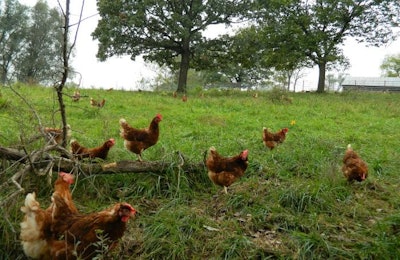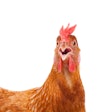
A new final rule establishing stricter animal welfare standards for the U.S. Department of Agriculture’s National Organic Program are being delayed until at least November 2017, but Mid-States Specialty Eggs and Eggs “R” Us Inc. argue the final rule – originally published in January 2017 – won’t hamper the organic egg business or send prices skyrocketing as some are predicting.
When in effect, the new rules will require all organic-certified animals to be given enough space to lay down, turn around, stand up, fully stretch their limbs without touching other animals or the side of the enclosure, and otherwise express natural behaviors. The regulation will establish new rules for housing, transportation and slaughter of organic poultry, too. Most importantly for egg producers, outside access will be mandatory. Verandas or porches attached to layer houses will no longer be classified as outdoor spaces.
Marion Hostetler, an owner of Mid-States and a member of the Organic Egg Farmers of America, said his company is exceeding this new standard and it’s doing it at a cost where it can sell at a price that beats other major producers. Mid-States and Eggs "R" Us were profiled in the July 2017 issue of Egg Industry. He estimated the size of the organic layer flock is about 15 million to 17 million birds. If 7 million of those birds were taken out of organic production due to the rule, as he said the rule could potentially do, then there could certainly be a market disruption. But in the long term, the market will even out. Even if prices spike, he said, it’s not likely organic eggs will enter the $8 per dozen territory. As of May 2017, Mid-States’ organic eggs sell for $3.99 a dozen
The provision is unpopular with major animal agriculture organizations like the National Chicken Council and National Pork Producers Council. When the rule was initially announced, the United Egg Producers (UEP) expressed displeasure.
“We had strong concerns over provisions related to outdoor access and the potentially significant – and prohibitive – cost implications of those changes on organic egg farmers,” David Inall, UEP senior vice president, said in a statement. “UEP is disappointed that long-accepted means of providing outdoor access, which are consistent with animal health, animal welfare and food safety, are being disallowed by this rule.”
Bill Schroeder, president of Mid-States’ egg marketing partner Eggs “R” Us, said he believes an organic egg should be produced in a natural setting, not on a fenced-in porch that does not give true outdoor access to the birds. He also dismissed the argument that hens in organic egg production are more susceptible to disease, like avian influenza. He said Mid-States farms were as close as 12 miles to outbreaks of avian influenza during the massive 2014-15 outbreak, but the birds were never infected. To the contrary, Schroeder and Hostetler said they believe outdoor access makes for a healthier bird.
















